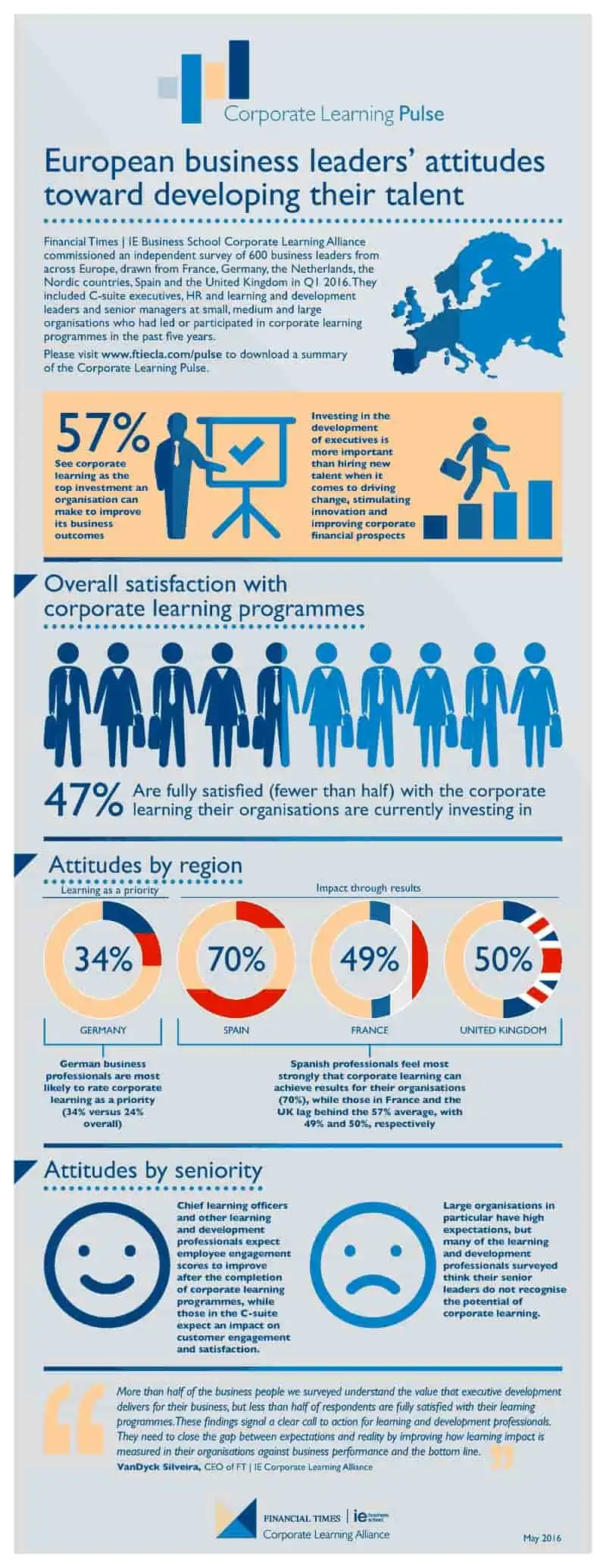Home>Corporate learning is a priority, say european business leaders
29.12.2017
Corporate learning is a priority, say european business leaders
FT | IE Corporate Learning Alliance, which Sciences Po Executive Education has joined in April, launches Corporate Learning Pulse to uncover European business attitudes toward investment in people.
Companies believe that investing in the development of their executives is more important than hiring new talent when it comes to driving change, stimulating innovation and improving corporate financial prospects, a survey of 600 business leaders from across Europe has found.
But, despite this, just under half those leaders surveyed find it a challenge to see how their investment in corporate learning adds value to their businesses in ways that are measurable against the bottom line.
The findings are unveiled in an independent survey, Corporate Learning Pulse, commissioned by Financial Times | IE Business School Corporate Learning Alliance in the first quarter of 2016.
Respondents in the inaugural survey, which is to be an annual event, were drawn from France, Germany, the Netherlands, the Nordic countries, Spain and the United Kingdom. They included C-suite executives, HR and learning and development leaders, and senior managers in small, medium and large organisations who had led or participated in executive development programmes in the past five years.
Corporate learning seen as top investment
According to the research, corporate learning is seen by respondents as the top investment their organisation can make to improve business outcomes (57 percent). A larger majority – 59 percent – say investing in employees “drives change and innovation” in their businesses, rising to 65 percent among C-suite respondents taken as a specific group.
Impact of corporate learning
Organisations are most likely to gauge the impact of their investment as it relates to two areas: employee satisfaction and engagement. Yet fewer than half (47 percent) are satisfied with the corporate learning their organisations are currently investing in, and just 43 percent believe that such programmes give them skills to do their jobs more effectively.
VanDyck Silveira, CEO of FT | IE Corporate Learning Alliance, says: “We are surprised to see the gap this major study reveals between the perceived value of corporate learning and the difficulties of measuring the business impact that such an investment can deliver. More than half of the business people we surveyed understand the value that executive development delivers for their business, but less than half of respondents are fully satisfied with their learning programmes.”
When it comes to corporate learning, expectations and action are misaligned
The survey found that when it comes to corporate learning, expectations and reality are often misaligned. And yet the ability to measure the eventual results tends not to be the highest priority when companies select a corporate learning partner to deliver executive development programmes.
Only one in four senior professionals say their organisation selects corporate learning partners based on their ability to measure impact. The main criterion is whether the organisation has worked with the learning provider in the past.
Among the most senior professionals (the C-suite and presidents or managing directors), marketplace reputation and rankings drive their choice of learning partners.
“These findings signal a clear call to action for learning and development professionals” says VanDyck Silveira. “They need to close the gap between expectations and reality by improving how learning impact is measured in their organisations against business performance and the bottom line.”
Attitudes vary by size of organisation, seniority and geography
German and Spanish professionals lead the way in seeing corporate learning as a business priority with the potential for positive outcomes. Large organisations in particular have high expectations, but many of the learning and development professionals think their senior leaders do not recognise the potential of corporate learning.
Organisations of all sizes agree that employees are the catalysts for change and innovation (59 percent) but professionals in large organisations (those with more than 500 employees) are least likely to say their senior leaders understand the value of corporate learning for the business.
Large organisations have the highest expectations for the impact of corporate learning on employee engagement and organisational change.
Chief learning officers and other learning and development professionals expect employee engagement scores to improve after the completion of corporate learning programmes, while those in the C-suite expect an impact on customer engagement and satisfaction.
The report, in English only.
FT | IE Corporate Learning Alliance, in partnership with Research Now, conducted an online survey for the Corporate Learning Pulse among 603 senior leaders in France, Germany, the Netherlands, the Nordics, Spain and the United Kingdom. Interviewing for the survey was conducted between 19 February and 7 March 2016. The margin of error for this study is +/- 5.00%.


